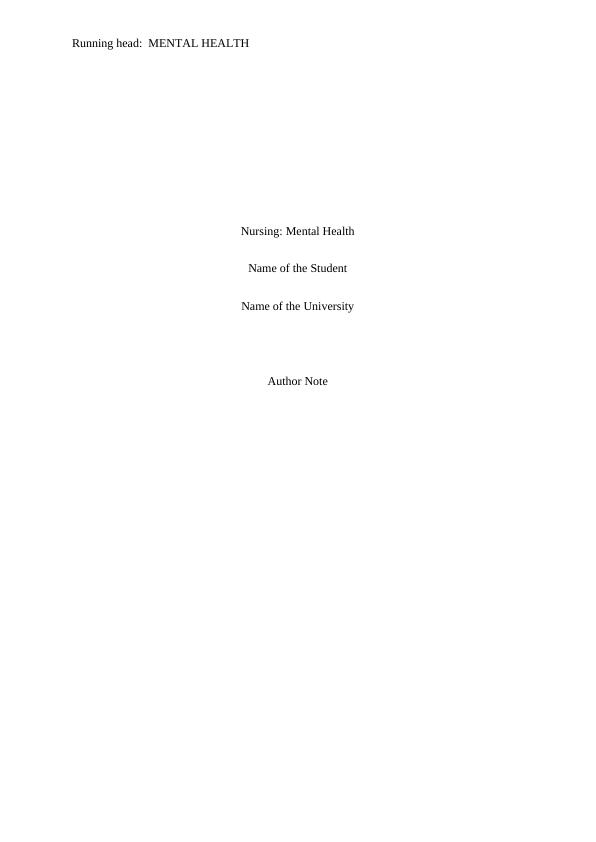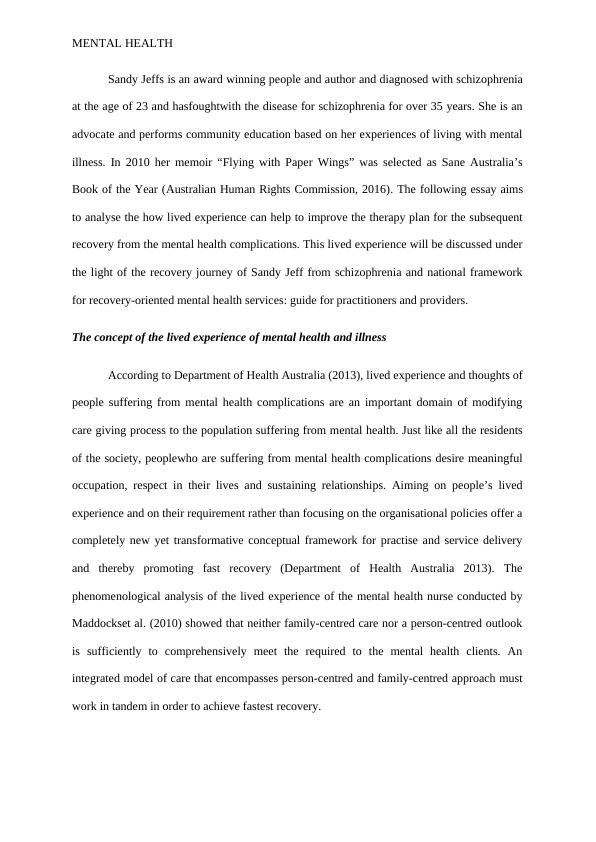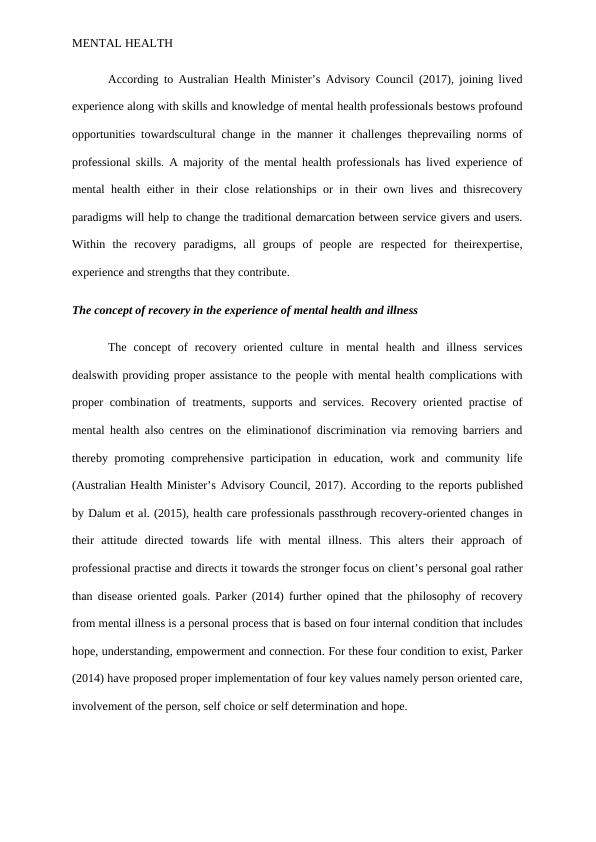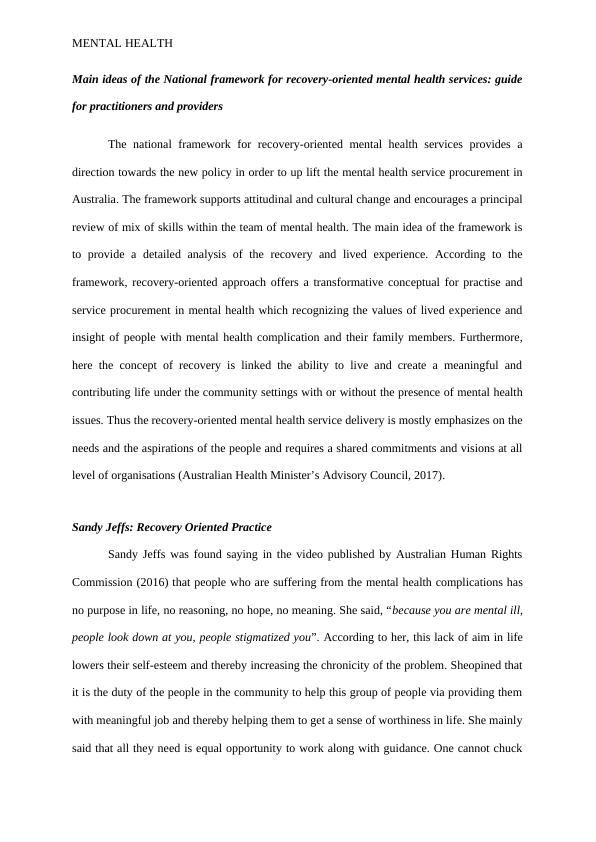Lived Experience and Recovery-Oriented Mental Health Services
Added on 2023-06-14
12 Pages2899 Words414 Views
Running head: MENTAL HEALTH
Nursing: Mental Health
Name of the Student
Name of the University
Author Note
Nursing: Mental Health
Name of the Student
Name of the University
Author Note

MENTAL HEALTH
Sandy Jeffs is an award winning people and author and diagnosed with schizophrenia
at the age of 23 and hasfoughtwith the disease for schizophrenia for over 35 years. She is an
advocate and performs community education based on her experiences of living with mental
illness. In 2010 her memoir “Flying with Paper Wings” was selected as Sane Australia’s
Book of the Year (Australian Human Rights Commission, 2016). The following essay aims
to analyse the how lived experience can help to improve the therapy plan for the subsequent
recovery from the mental health complications. This lived experience will be discussed under
the light of the recovery journey of Sandy Jeff from schizophrenia and national framework
for recovery-oriented mental health services: guide for practitioners and providers.
The concept of the lived experience of mental health and illness
According to Department of Health Australia (2013), lived experience and thoughts of
people suffering from mental health complications are an important domain of modifying
care giving process to the population suffering from mental health. Just like all the residents
of the society, peoplewho are suffering from mental health complications desire meaningful
occupation, respect in their lives and sustaining relationships. Aiming on people’s lived
experience and on their requirement rather than focusing on the organisational policies offer a
completely new yet transformative conceptual framework for practise and service delivery
and thereby promoting fast recovery (Department of Health Australia 2013). The
phenomenological analysis of the lived experience of the mental health nurse conducted by
Maddockset al. (2010) showed that neither family-centred care nor a person-centred outlook
is sufficiently to comprehensively meet the required to the mental health clients. An
integrated model of care that encompasses person-centred and family-centred approach must
work in tandem in order to achieve fastest recovery.
Sandy Jeffs is an award winning people and author and diagnosed with schizophrenia
at the age of 23 and hasfoughtwith the disease for schizophrenia for over 35 years. She is an
advocate and performs community education based on her experiences of living with mental
illness. In 2010 her memoir “Flying with Paper Wings” was selected as Sane Australia’s
Book of the Year (Australian Human Rights Commission, 2016). The following essay aims
to analyse the how lived experience can help to improve the therapy plan for the subsequent
recovery from the mental health complications. This lived experience will be discussed under
the light of the recovery journey of Sandy Jeff from schizophrenia and national framework
for recovery-oriented mental health services: guide for practitioners and providers.
The concept of the lived experience of mental health and illness
According to Department of Health Australia (2013), lived experience and thoughts of
people suffering from mental health complications are an important domain of modifying
care giving process to the population suffering from mental health. Just like all the residents
of the society, peoplewho are suffering from mental health complications desire meaningful
occupation, respect in their lives and sustaining relationships. Aiming on people’s lived
experience and on their requirement rather than focusing on the organisational policies offer a
completely new yet transformative conceptual framework for practise and service delivery
and thereby promoting fast recovery (Department of Health Australia 2013). The
phenomenological analysis of the lived experience of the mental health nurse conducted by
Maddockset al. (2010) showed that neither family-centred care nor a person-centred outlook
is sufficiently to comprehensively meet the required to the mental health clients. An
integrated model of care that encompasses person-centred and family-centred approach must
work in tandem in order to achieve fastest recovery.

MENTAL HEALTH
According to Australian Health Minister’s Advisory Council (2017), joining lived
experience along with skills and knowledge of mental health professionals bestows profound
opportunities towardscultural change in the manner it challenges theprevailing norms of
professional skills. A majority of the mental health professionals has lived experience of
mental health either in their close relationships or in their own lives and thisrecovery
paradigms will help to change the traditional demarcation between service givers and users.
Within the recovery paradigms, all groups of people are respected for theirexpertise,
experience and strengths that they contribute.
The concept of recovery in the experience of mental health and illness
The concept of recovery oriented culture in mental health and illness services
dealswith providing proper assistance to the people with mental health complications with
proper combination of treatments, supports and services. Recovery oriented practise of
mental health also centres on the eliminationof discrimination via removing barriers and
thereby promoting comprehensive participation in education, work and community life
(Australian Health Minister’s Advisory Council, 2017). According to the reports published
by Dalum et al. (2015), health care professionals passthrough recovery-oriented changes in
their attitude directed towards life with mental illness. This alters their approach of
professional practise and directs it towards the stronger focus on client’s personal goal rather
than disease oriented goals. Parker (2014) further opined that the philosophy of recovery
from mental illness is a personal process that is based on four internal condition that includes
hope, understanding, empowerment and connection. For these four condition to exist, Parker
(2014) have proposed proper implementation of four key values namely person oriented care,
involvement of the person, self choice or self determination and hope.
According to Australian Health Minister’s Advisory Council (2017), joining lived
experience along with skills and knowledge of mental health professionals bestows profound
opportunities towardscultural change in the manner it challenges theprevailing norms of
professional skills. A majority of the mental health professionals has lived experience of
mental health either in their close relationships or in their own lives and thisrecovery
paradigms will help to change the traditional demarcation between service givers and users.
Within the recovery paradigms, all groups of people are respected for theirexpertise,
experience and strengths that they contribute.
The concept of recovery in the experience of mental health and illness
The concept of recovery oriented culture in mental health and illness services
dealswith providing proper assistance to the people with mental health complications with
proper combination of treatments, supports and services. Recovery oriented practise of
mental health also centres on the eliminationof discrimination via removing barriers and
thereby promoting comprehensive participation in education, work and community life
(Australian Health Minister’s Advisory Council, 2017). According to the reports published
by Dalum et al. (2015), health care professionals passthrough recovery-oriented changes in
their attitude directed towards life with mental illness. This alters their approach of
professional practise and directs it towards the stronger focus on client’s personal goal rather
than disease oriented goals. Parker (2014) further opined that the philosophy of recovery
from mental illness is a personal process that is based on four internal condition that includes
hope, understanding, empowerment and connection. For these four condition to exist, Parker
(2014) have proposed proper implementation of four key values namely person oriented care,
involvement of the person, self choice or self determination and hope.

MENTAL HEALTH
Main ideas of the National framework for recovery-oriented mental health services: guide
for practitioners and providers
The national framework for recovery-oriented mental health services provides a
direction towards the new policy in order to up lift the mental health service procurement in
Australia. The framework supports attitudinal and cultural change and encourages a principal
review of mix of skills within the team of mental health. The main idea of the framework is
to provide a detailed analysis of the recovery and lived experience. According to the
framework, recovery-oriented approach offers a transformative conceptual for practise and
service procurement in mental health which recognizing the values of lived experience and
insight of people with mental health complication and their family members. Furthermore,
here the concept of recovery is linked the ability to live and create a meaningful and
contributing life under the community settings with or without the presence of mental health
issues. Thus the recovery-oriented mental health service delivery is mostly emphasizes on the
needs and the aspirations of the people and requires a shared commitments and visions at all
level of organisations (Australian Health Minister’s Advisory Council, 2017).
Sandy Jeffs: Recovery Oriented Practice
Sandy Jeffs was found saying in the video published by Australian Human Rights
Commission (2016) that people who are suffering from the mental health complications has
no purpose in life, no reasoning, no hope, no meaning. She said, “because you are mental ill,
people look down at you, people stigmatized you”. According to her, this lack of aim in life
lowers their self-esteem and thereby increasing the chronicity of the problem. Sheopined that
it is the duty of the people in the community to help this group of people via providing them
with meaningful job and thereby helping them to get a sense of worthiness in life. She mainly
said that all they need is equal opportunity to work along with guidance. One cannot chuck
Main ideas of the National framework for recovery-oriented mental health services: guide
for practitioners and providers
The national framework for recovery-oriented mental health services provides a
direction towards the new policy in order to up lift the mental health service procurement in
Australia. The framework supports attitudinal and cultural change and encourages a principal
review of mix of skills within the team of mental health. The main idea of the framework is
to provide a detailed analysis of the recovery and lived experience. According to the
framework, recovery-oriented approach offers a transformative conceptual for practise and
service procurement in mental health which recognizing the values of lived experience and
insight of people with mental health complication and their family members. Furthermore,
here the concept of recovery is linked the ability to live and create a meaningful and
contributing life under the community settings with or without the presence of mental health
issues. Thus the recovery-oriented mental health service delivery is mostly emphasizes on the
needs and the aspirations of the people and requires a shared commitments and visions at all
level of organisations (Australian Health Minister’s Advisory Council, 2017).
Sandy Jeffs: Recovery Oriented Practice
Sandy Jeffs was found saying in the video published by Australian Human Rights
Commission (2016) that people who are suffering from the mental health complications has
no purpose in life, no reasoning, no hope, no meaning. She said, “because you are mental ill,
people look down at you, people stigmatized you”. According to her, this lack of aim in life
lowers their self-esteem and thereby increasing the chronicity of the problem. Sheopined that
it is the duty of the people in the community to help this group of people via providing them
with meaningful job and thereby helping them to get a sense of worthiness in life. She mainly
said that all they need is equal opportunity to work along with guidance. One cannot chuck

End of preview
Want to access all the pages? Upload your documents or become a member.
Related Documents
Mental Health Solution Assignmentlg...
|11
|2572
|36
Principles of Recovery-Oriented Mental Health Practicelg...
|11
|2970
|185
Sandy Jeffs: Principles of Recovery-Oriented Mental Health Practicelg...
|10
|2504
|342
Mental Health and Illness: Understanding the Recovery-Oriented Practiceslg...
|8
|2254
|424
Mental Health Illness: Case Studylg...
|10
|2832
|440
Principles of Recovery: The Case of Sandy Jeffslg...
|10
|2391
|120
